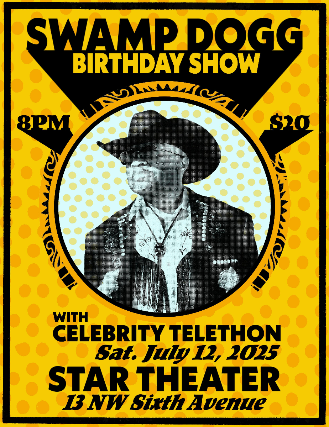TICKET SALES TERMINATED
Tickets are currently unavailable on TicketWeb

Star Theater Presents
SWAMP DOGG BIRTHDAY SHOW with Jack Habegger's Celebrity Telethon
Sat, 12 Jul, 9:00 PM PDT
Doors open
8:00 PM PDT
Star Theater
13 NW Sixth Avenue, Portland, OR 97209
TICKET SALES TERMINATED
Tickets are currently unavailable on TicketWeb
Description
“Not a lot of people talk about the true origins of bluegrass music,” says Swamp Dogg, “but it came from Black people. The banjo, the washtub, all that stuff started with African Americans. We were playing it before it even had a name.”
Swamp Dogg’s remarkable new album, Blackgrass: From West Virginia to 125th St., is no history lesson, though. Produced by Ryan Olson (Bon Iver, Poliça) and recorded with an all-star band including Noam Pikelny, Sierra Hull, Jerry Douglas, Chris Scruggs, Billy Contreras, and Kenny Vaughan, the collection is a riotous blend of past and present, mixing the sacred and the profane in typical Swamp Dogg fashion as it blurs the lines between folk, roots, country, blues, and soul. The tracklist is an eclectic one—brand new originals and vintage Swamp Dogg classics sit side by side with reimaginings of ’70s R&B hits and timeless ’50s pop tunes—but the performances here are thoroughly cohesive, filtering everything through a progressive Appalachian lens that nods to tradition without ever being bound by it. Special guests like Margo Price, Vernon Reid, Jenny Lewis, Justin Vernon, and The Cactus Blossoms all add to the excitement, but it’s ultimately the 81-year-old Swamp Dogg’s delivery—sly and playful and full of genuine joy and ache—that steals the show. The result is a record that’s as reverent as it is raunchy, a collection that challenges conventional notions of genre and race while at the same time celebrating the music that helped make Swamp Dogg the beloved iconoclast he’s known as today.
But, as the SXSW-premiered documentary Swamp Dogg Gets His Pool Painted reveals, there’s always been more to Swamp Dogg than just soul music. As far back as the early 1970s, he was covering tunes like Prine’s “Sam Stone,” an act of veneration that Prine would later return by appearing on Swamp Dogg’s widely acclaimed 2020 record, Sorry You Couldn’t Make It. Those performances turned out to be some of Prine’s final recordings before his death, making Blackgrass’s release on Prine’s Oh Boy label all the more poignant.
“It means a hell of a lot to put this record out on the label that John started,” Swamp Dogg reflects. “He wrote some of the greatest songs of all time, songs that could make you dance inside. He was like a pastor on Sunday, getting you to think about what’s going on in the world and how we should be coping with it. I always want to give thanks to John.”
“Black music has had so many different labels put on it over the years that sometimes I’m onstage and I don’t know what the Hell it is that I’m singing,” Swamp Dogg says with a laugh. “The only thing I know how to do is be myself.”
And nobody does that better than Swamp Dogg.
Event Information
Age Limit
21+
Refund Policy
Supporting acts are subject to change. Please check the show listing prior to attending. No refunds will be issued once ticket(s) have been redeemed or after show day.
